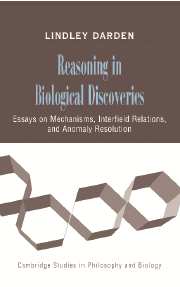 Reasoning in Biological Discoveries
Reasoning in Biological Discoveries Book contents
- Frontmatter
- Contents
- Long Contents
- List of Figures
- List of Tables
- Acknowledgments
- Introduction
- PART I BIOLOGICAL MECHANISMS
- PART II REASONING STRATEGIES: RELATING FIELDS, RESOLVING ANOMALIES
- 5 Interfield Theories with Nancy Maull
- 6 Theory Construction in Genetics
- 7 Relations Among Fields in the Evolutionary Synthesis
- 8 Selection Type Theories with Joseph A. Cain
- 9 Strategies for Anomaly Resolution: Diagnosis and Redesign
- 10 Exemplars, Abstractions, and Anomalies: Representations and Theory Change in Mendelian and Molecular Genetics
- 11 Strategies for Anomaly Resolution in the Case of Adaptive Mutation
- PART III DISCOVERING MECHANISMS: CONSTRUCTION, EVALUATION, REVISION
- Bibliography
- Index
- References
6 - Theory Construction in Genetics
Published online by Cambridge University Press: 31 August 2009
- Frontmatter
- Contents
- Long Contents
- List of Figures
- List of Tables
- Acknowledgments
- Introduction
- PART I BIOLOGICAL MECHANISMS
- PART II REASONING STRATEGIES: RELATING FIELDS, RESOLVING ANOMALIES
- 5 Interfield Theories with Nancy Maull
- 6 Theory Construction in Genetics
- 7 Relations Among Fields in the Evolutionary Synthesis
- 8 Selection Type Theories with Joseph A. Cain
- 9 Strategies for Anomaly Resolution: Diagnosis and Redesign
- 10 Exemplars, Abstractions, and Anomalies: Representations and Theory Change in Mendelian and Molecular Genetics
- 11 Strategies for Anomaly Resolution in the Case of Adaptive Mutation
- PART III DISCOVERING MECHANISMS: CONSTRUCTION, EVALUATION, REVISION
- Bibliography
- Index
- References
Summary
Philosophers of science have had relatively little to say about theory construction. Theories were treated by Popper (1965) and the logical empiricists (e.g., Hempel 1966) as if they arose all at once by a creative leap of the imagination of a scientist, a process whose study was viewed as the province of the psychologist. Only after the creative leap, they agreed, were the philosopher's logical tools useful to evaluate the theory so produced. Even more historical accounts concerned with scientific change, such as Kuhn's (1970), did not discuss the way paradigms or the theories within them were constructed, except that they somehow arose in response to anomalies of their predecessors. Lakatos (1970), who proposed criteria for evaluating progressive research programs, did not discuss how the scientist constructs the program originally, although later additions, he claimed, resulted in some way from the “positive heuristic.” Even Laudan (1977), who made much of the commonplace observation that science is a problem-solving activity, focused on the use of solved or unsolved problems to evaluate theories and research traditions; he did not provide an analysis of how a scientist goes about solving a problem. Thus, most of twentieth-century philosophy of science, from the logical empiricists to the most recent work, has been within the context of justification, not the context of discovery.
Dichotomizing science into these mutually exclusive contexts and concentrating on justification to the exclusion of discovery distorts the ongoing process that characterizes science.
- Type
- Chapter
- Information
- Reasoning in Biological DiscoveriesEssays on Mechanisms, Interfield Relations, and Anomaly Resolution, pp. 149 - 169Publisher: Cambridge University PressPrint publication year: 2006
References
- 1
- Cited by


